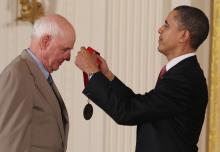Economic Justice
On the Politico opinion pages, Jason Ackerman examines how food assistance programs could be better utilized:

We'll be hearing a lot about Medicare between now and November. President Barack Obama wants to tweak it. Mitt Romney wants to reinvent it. Everyone who wants to get elected, however, agrees on one thing: nothing will change for the current crop of seniors and soon-to-be seniors.
Whew. Six months and Mr. Neff will be home free! Less than a year and a half and we'll both have free health care! And then we can afford to retire, right?
Wrong.
The Boston Globe reports on a new partnership between Harvard University and the Massachusetts Institute of Technology:
Harvard University and the Massachusetts Institute of Technology will team up on a $60 million initiative to offer free online, college-level courses under a joint superbrand known as edX, the universities said Wednesday.
Read more about the initiative here
In an interview with Rolling Stone, Paul Krugman talks about his new book, and why fixing the economy is easier than we think:
Four years after the start of the Great Recession, nobody would mistake U.S. economy for a thrumming engine of growth, prosperity, and human flourishing. Sure, we're officially out of "recession." But the recovery is painfully slow and uneven, and 24 million Americans are still unemployed or underemployed. There's a lot of pain out there, and a lot of potential going to waste.
Read the interview here
From Politico:
American soldiers learned the hard way not to walk down enemy trails in Vietnam — and certainly not twice. But here come the House Republicans, marching into the sunlight by shifting billions from poverty programs to the Pentagon, all within hours of adopting an entirely new round of tax cuts for those earning more than $1 million a year.
Read more about this story here

As I walked around Union Square in NYC yesterday between 4 and 5:30, waiting for the march down Broadway to begin, memories of occupied Zuccotti Park came to mind. Handmade signs about a very wide range of issues were everywhere. There were drumming and musical groups doing their rhythmic things and people dancing as they did so. There was Reverend Billy performing, and an incredibly well done colored chalk piece of artwork on the sidewalk near 17th and Broadway. People everywhere, mainly white folks but diverse, lots of young people but with a significant number of non-young people.
And a spirit of hope, a spirit which declared: “we are here, we are organized, we have not been defeated and we are not going away.”
From Salon yesterday:
Last Friday, the U.S. Government announced that 7.2 percent of Americans in the labor force earn so little that they are living in poverty. Reuters noted that the percentage of the working poor is the highest in at least two decades. The rate was 7 percent in 2009, 5 percent in 1999, and 5.5 percent in 1987.
Read the full story here
"As Jesus said, 'Tough love your neighbor as yourself...get your own loaves and fishes.'" ~ Stephen Colbert
The Colbert Report
Get More: Colbert Report Full Episodes,Political Humor & Satire Blog,Video Archive
More from Colbert and Georgetown's Father Thomas Reese inside the blog.

Today is May Day – an historic day of protest and action for the working class. This year, in light of the Occupy movement, many are hopeful of the resurgence this day can bring in the fight for national against economic injustice.
PEOPLE GAMBLE—always have, and always will. But when the state decides to encourage this human tendency and exploit it for its own profit, then we definitely have a moral problem.
In December, the U.S. Justice Department ruled that it is permissible for states to sell lottery tickets online, making it easier for state governments to bilk their citizens. Illinois internet lottery sales were slated to begin in late March. Although the sales are limited to state residents, the greater convenience of internet buying will likely cause more people to try the lottery.
In contrast to a “sin tax” on alcohol and cigarettes, in the case of the lottery the state becomes a pusher of gambling. The government, rather than serving and protecting its people, is “the house,” committed to creating more losers to make more money.
When we follow the advertising money, we discover that the lottery has been sold primarily to the poor and those on fixed incomes: The billboards are in the inner city, not the upscale suburbs. The lottery is promoted in such places with the deceitful promise that a buyer has a good chance to win security for a lifetime.
The Illinois Lottery was started in 1974 and, since 1985, its profits have gone by law to fund public education. In a classic example of “bait and switch,” however, legislators put the lottery money into school funding—but redirected the former funds to other parts of the state budget. Public education remains a major concern in Illinois, even as the lottery has added gimmick after gimmick over the years. Today the state legislature budgets only 75 percent of what is, according to an advisory committee, the minimum acceptable spending per student; it has almost a billion dollars in unmet obligations to the schools.
If the GOP presidential primaries have been any indication, voter turnout for November's election could be fairly dismal. Between the uber-polarization of the parties and nationwide trend toward the middle at a voter level, many may opt to stay at home.
The lack of enthusiasm is especially evident in the youngest voting bloc, age 18-24. According to the latest from Public Religion Research and Georgetown University's Berkley Center, young adults are not exactly excited about their prospects of either political persuasion. Further, while one in six of them are registered to vote, only 46 percent plan to cast theirs in November.
But apart from the state of public discourse and apathy concerns of the weary voter, another issue is creeping up that could pose a problem for potential turnout—money.
According to The Atlantic Cities, some cities simply don't have the money—and have to cut elsewhere—to host an election.
"… municipalities are scrambling to pay the costs associated with manning polling places. Some have said they'll put off road repairs while transit crews work on Election Day. Others may borrow workers from other departments to help count votes. In practice, this will likely mean fewer voting precincts, shorter hours and longer lines."
In a culture that is not known for its patience or attention span, how will this trend affect the public's motivation, or lack thereof, to hit the polls in November?

On Monday evening Wendell Berry delivered the 41st annual Jefferson Lecture in the Humanities, sponsored by the National Endowment of the Humanities, at the John F. Kennedy Center in Washington D.C. According to the NEH, this is “the most prestigious honor the federal government bestows for distinguished intellectual achievement in the humanities.”
In front of hundreds, Berry took his place among former recipients (Walker Percy, Toni Morrison, Arthur Miller, John Updike, and many others) to deliver a resonating essay on the beauty of place, imagination, and pleasure, titled “It All Turns on Affection.” The title hinges on E.M. Forster’s 1910 novel Howards End, which Berry said, takes some of its thrust as a “manifesto against materialism.”

When Morgan Stanley CEO James Gorman stepped up this year to defend Goldman Sachs – a company that was reeling from former employee Greg Smith’s New York Times op-ed decrying the change in culture at the company (and is now reeling from a sex-trafficking website scandal) – Gorman intimated the need for compassion by noting “there but for the grace of God go us."
This got my attention immediately. Not because Gorman, in the lead up to the “grace of God” intimation, asked that Smith’s commentary not be emailed around by Morgan Stanley staff. Not because Gorman suggested that the New York Times was out of line for printing public opinion.
No, Gorman got my attention because while it was out of line for Morgan Stanley’s CEO to suggest grace in considering Wall Street culture, that phrase has been a mantra of mine ever since my youth.
Under a mandate from the budget resolution passed by the House in March, committees are required to cut discretionary programs to avoid the automatic cuts in military spending to take effect in January. The funds cut are to be moved from the nondefense to the defense categories in the budget. Yesterday, the House Agriculture Committee produced its share by cutting $33 billion from the Supplemental Nutrition Assistance Program (SNAP, or food stamps).
Rep. Collin Peterson of Minnesota, the ranking Democrat on the Committee had this response: “You can’t have a serious conversation about getting the budget under control when you take large items like defense off the table, which is really why we are here. Taking a meat-ax to nutrition programs that feed millions of working families in this country in order to avoid defense cuts is not a serious way to achieve deficit reduction.”
The Center on Budget and Policy Priorities estimates that a cut this large would result in 2 million people losing benefits and the remaining 44 million having theirs reduced. So here’s the equation, more hungry people = more weapons for war. It’s clear and direct.
Duane Shank is Senior Policy Advisor at Sojourners. You can follow him on Twitter @DShankDC.

A week after House Budget Committee Chairman Paul Ryan claimed his Catholic faith inspired the Republicans' cost-cutting budget plan, the nation’s Catholic bishops reiterated their demand that the federal budget protect the poor, and said the GOP measure “fails to meet these moral criteria.”
That and other strongly-worded judgments on the GOP budget proposal flew in a flurry of letters from leading bishops to the chairmen of key congressional committee.
The letters to Capitol Hill were highlighted in a Tuesday (April 17) statement from the U.S. Conference of Catholic Bishops that came after Ryan, a Wisconsin Republican and rising conservative hero, told an interviewer last week (April 10) that his fiscal views were informed by Catholic social teaching.
Melissa Boteach of Half-in-Ten—the campaign to cut poverty in half in 10 years—is using the Katniss defense against the Ryan budget cuts.
The world that Suzanne Collins paints in the The Hunger Games is one in which only the strong survive. Those that can’t keep up are cut out, kind of like the Ryan budget.
One of the radical things about the ethical agenda that Jesus promoted was the place he offered to the sick, the weak and the weary. He flipped common understanding of who was “deserving” and who was “undeserving” upside down.
The Catholic Bishops have now come out with their concerns about the Ryan budget and how it abandons the poor and the hungry. Take a look at Melissa’s chart, what do you think?


Faith and fishing: two central parts of Louisiana’s vibrant coastal culture. Every April, going back generations, you can see them intersect in a celebration of bayou life at the annual Blessing of the Fleet in Chauvin, La. Families welcome the opening of the year’s first shrimp season by coming together to pray for family and friends who depend on the seafood industry, and for a healthy ecosystem that yields a bountiful catch.
“We pray for the safety and welfare of all fishermen,” said Fr. Frederic Brunet, pastor of St. Joseph Catholic church who has presided over the event for many years. “Bless the shrimp and crabs and help us to catch a lot of them.”
This year saw the second blessing since the BP Oil Spill shut down the Gulf fishing industry in 2010. Since then, many shrimpers have reported problems: poor catches and startling irregularities (such as shrimp with no eyes).
Today is a holiday in the District of Columbia, although primarily observed only by the D.C. government, and likely unknown to the rest of the country. But it’s a commemoration worth noting.
One-hundred and fifty years ago, April 16, 1862, President Abraham Lincoln signed the District of Columbia Emancipation Act, freeing more than 3,000 slaves within its borders. It predated the more famous Emancipation Proclamation, which came nearly 10 months later on January 1, 1863.
Yet, while legal slavery is long gone, economic disparities are vast and growing. The income gap is one of the widest in the country, with a white per capita income more than triple that of African-Americans. The poverty rate is 20 percent, 30 percent for children,
Politically, all Washingtonians, regardless of race, remain disenfranchised – we have no elected voting representative in Congress, while Congress retains veto power over our budget. That leads to it using us to enact their pet ideas – repealing a variety of legislation duly passed by our City Council and Mayor.
For D.C. residents, today is a day to remember and celebrate the end of slavery, while renewing the struggle for economic justice and full representation as citizens of the United States.
I finished up my taxes last night. I didn’t think much of the hour I spent on the phone with my dad making sure I filed correctly. Taxes are always complicated, right?
Well, maybe that’s because the folks at Intuit (the publishers of TurboTax) want them to be.
Matt Stoller over at Republic Report pointed out that the ReadyReturn program in California sends tax payers a form showing how much they owe in taxes. Then they just sign it and send it back. It costs less for the state to process and it saves tax payers a lot of time.
During the 2008 campaign, President Barack Obama promised to implement something similar on the federal level. What happened?
Stoller also notes that since 2008, Intuit has spent a good $9 million on lobbying. And according to one of their investor reports, keeping taxes complicated is a top priority:
Our consumer tax business also faces significant competition from the public sector, where we face the risk of federal and state taxing authorities developing software or other systems to facilitate tax return preparation and electronic filing at no charge to taxpayers. These or similar programs may be introduced or expanded in the future, which may cause us to lose customers and revenue. For example, during tax season 2010, the federal government introduced a prepaid debit card program to facilitate the refund process. Our consumer and professional tax businesses provide this service as well.
If that doesn’t make you mad, take a look at why you are probably paying $500 more a year for your cell phone then you should be.
In response to Rep. Paul Ryan’s recent comments justifying the Republican budget plan on Catholic grounds, 60 prominent Catholic leaders today released a statement saying his claims “profoundly distort” Catholic teaching.
“Simply put, this budget is morally indefensible and betrays Catholic principles of solidarity, just taxation and a commitment to the common good,” the statement reads. “A budget that turns its back on the hungry, the elderly and the sick while giving more tax breaks to the wealthiest few can’t be justified in Christian terms.”
John Gehring, Catholic Outreach Coordinator at Faith in Public Life, believes Ryan’s beliefs are skewed.
“This budget turns centuries of Catholic social teaching on its head,” Gehring said in a news release. “These Catholic leaders and many Catholics in the pews are tired of faith being misused to bless an immoral agenda.”
Read the full statement and signatories HERE.